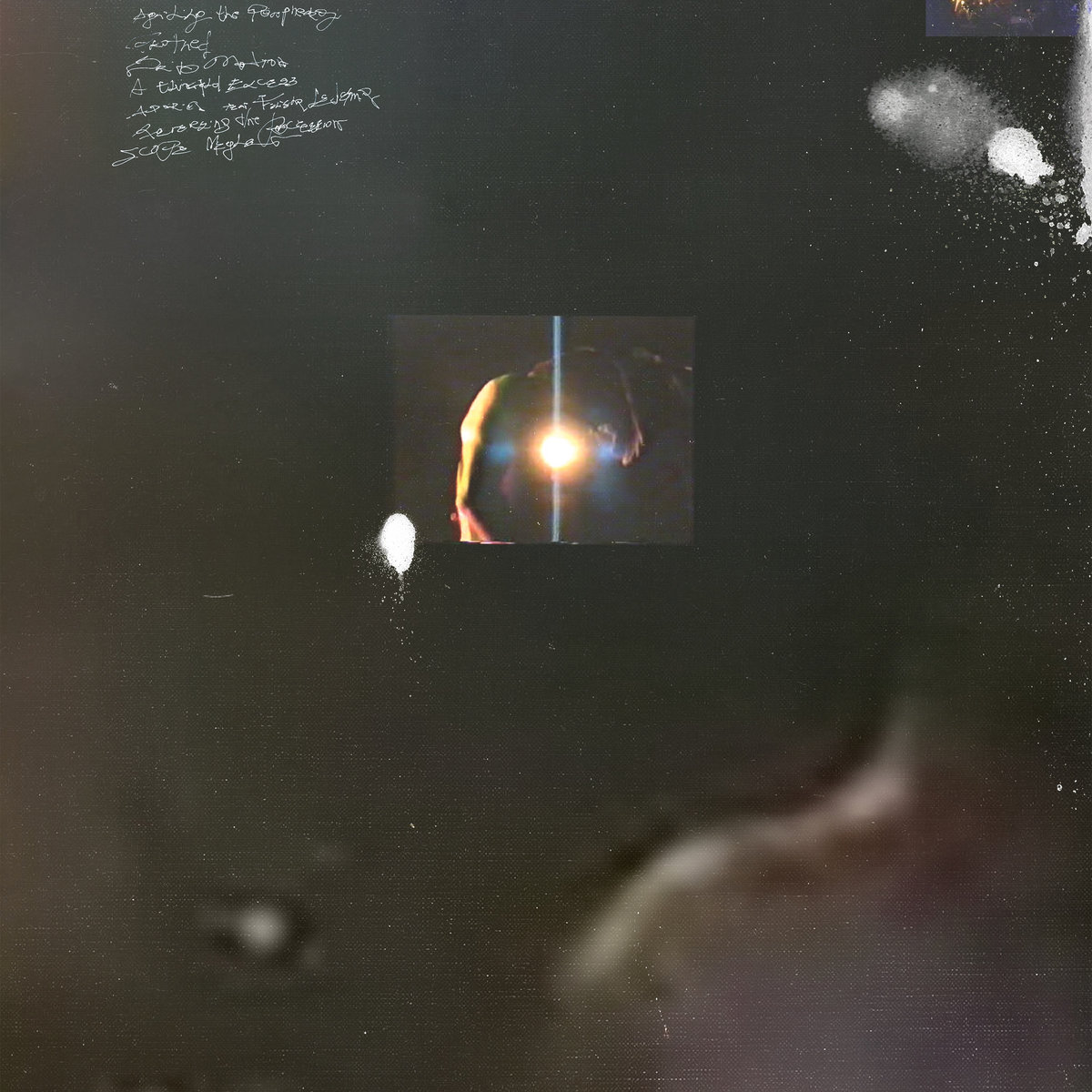 I was a bit later to the Angelo Harmsworth party than I would have liked, but the Berlin-based American composer has been fitfully releasing very distinctive blown-out "ambient" albums for about a decade now on an array of hip and discriminating small labels (Opal Tapes, Vaagner, enmossed, Psychic Liberation, etc.). Harmsworth's latest is his first for Students of Decay and marks a rare vinyl outing, as most of his previous physical releases have been limited to cassette. According to the label, Singe "may be the high water mark" of Harmsworth's career to date, which does feel like a completely plausible claim, but one that is very hard to confidently echo given how many killer Harmsworth pieces already exist. Even if Singe fails to conclusively eclipse all of Harmsworth's past triumphs, however, it does seem to be one of his most consistently strong releases and an ideal starting point for the curious. Notably, describing Harmsworth's vision as "ambient" or even "power ambient" feels cruelly reductionist, which is probably why he amusingly titled a 2020 release Fully Automated Luxury Ambient. That imaginary subgenre feels much closer to the mark, as the intensity and textural inventiveness that Angelo brings to these compositions shares far more common ground with artists like Tim Hecker or Fennesz (or collapsing power lines during a live volcano) than it does with anyone trafficking in droning, meditative loops.
I was a bit later to the Angelo Harmsworth party than I would have liked, but the Berlin-based American composer has been fitfully releasing very distinctive blown-out "ambient" albums for about a decade now on an array of hip and discriminating small labels (Opal Tapes, Vaagner, enmossed, Psychic Liberation, etc.). Harmsworth's latest is his first for Students of Decay and marks a rare vinyl outing, as most of his previous physical releases have been limited to cassette. According to the label, Singe "may be the high water mark" of Harmsworth's career to date, which does feel like a completely plausible claim, but one that is very hard to confidently echo given how many killer Harmsworth pieces already exist. Even if Singe fails to conclusively eclipse all of Harmsworth's past triumphs, however, it does seem to be one of his most consistently strong releases and an ideal starting point for the curious. Notably, describing Harmsworth's vision as "ambient" or even "power ambient" feels cruelly reductionist, which is probably why he amusingly titled a 2020 release Fully Automated Luxury Ambient. That imaginary subgenre feels much closer to the mark, as the intensity and textural inventiveness that Angelo brings to these compositions shares far more common ground with artists like Tim Hecker or Fennesz (or collapsing power lines during a live volcano) than it does with anyone trafficking in droning, meditative loops.
Those craving the aforementioned "collapsing power lines" vibe will have a mercifully short wait, as the opening "Igniting the Periphery" calls to mind buzzing high tension wires swayed by a deep seismic shudder as the surrounding buildings collapse in slow motion. There are some other elements as well, like fragments of twinkling piano and warm waves of frayed drones, but the viscerally heaving, buzzing, and gnarled wreckage at the heart of the piece is the showstopper—everything else is just there to color the mood. That balance holds true for the rest of the album as well, as the Singe experience feels akin to wandering through six cataclysmic yet weirdly beautiful natural disasters. For example, the crackling and hissing "Frothed" evokes slow jets of magma breaking through a buckling, blasted landscape, while "Drip Motion" has the feel of a storm slowly forming and then slowly dissipating. In short, Harmsworth harnesses the proverbial "force of nature" and wields it beautifully. That said, "Drip Motion" is an album highlight for more conventionally musical reasons as well, as it resembles the burning and heaving wreckage of a killer Porter Ricks cut fading in and out of focus. "A Twofold Excess" then ends the album's first half with yet another gem, as it feels like slowed-down footage of a tornado ripping apart a sawmill before dissolving into a sublime coda of sputtering static, tender piano, and warbling, whimpering streaks of psychedelia.
Somehow, the weather forecast only gets crazier for the album's second half, though that is hardly surprising given that "Aporia" seems to not even be earthbound anymore, as Harmsworth conjures a buzzing and shuddering alien landscape of strangled static and quivering feedback. In addition to that, there are some elements that sound like field recordings of a welding crew on the Death Star along with a guest appearance by Felisha Ledesma. Sadly, Ledesma does not stick around very long (I'm a big fan of her Fringe album), but a human voice emerging from the howling industrial ruin was unexpected enough to leave an impression regardless. Elsewhere, "Reversing the Procession" calls to mind flickering ghosts in the burning, buckling hull of a sinking shop and probably marks the album's zenith as far as sheer churning physicality is concerned. The closing "Scope Neglect" may be the album's zenith beauty-wise though, calling to mind slow-motion footage of a burning spacecraft breaking apart as it falls to earth. Hell, I'll even throw in a dramatic sunset as a backdrop, as "Scope Neglect" is an absolutely gorgeous example of Harmsworth's vision of elemental power and blackened beauty. And Singe is one hell of an album. In fact, I would be hard pressed to think of another artist who could have made an album in this vein without lapsing into unlistenable bombast or erring too much into the "noise" or "ambient" side of the delicate balance. In Harmsworth's hands, however, Singe feels like a series of vivid field recordings taken from the end of the world.